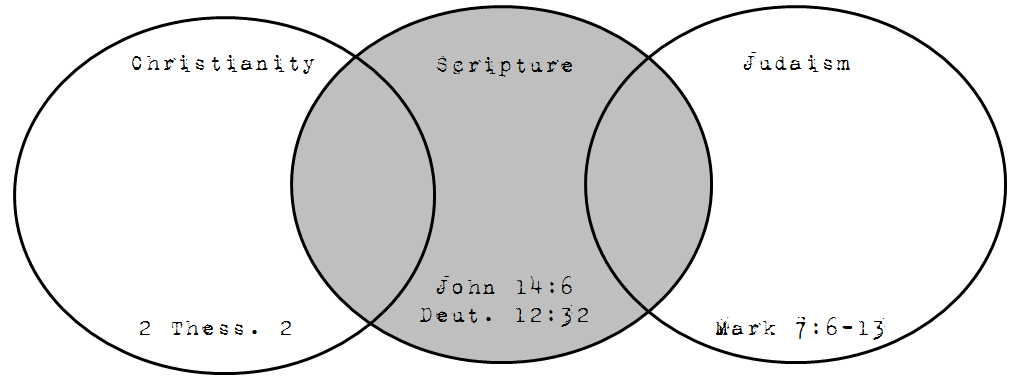
A special Sabbath dinner
Traditions develop even if we don’t mean to.
You have traditions in the way you brush your teeth each morning. You have traditions in how you load the dishwasher. You have traditions in favorite recipes, ways you like to spend your vacations, how you like to do your hair. In fact, having no tradition is itself a tradition.
Traditions bind families and communities together. They give you a sense of identity.
Traditions are only bad when you think your way of doing things is the only right way. Your brand of toothpaste. Your correct way of putting the silverware in the dishwasher. Your way of making chili. Your preference for mountains over beaches. Your love of straight hair rather than curls.
Now if the Creator of the Universe happened to say that Crest® toothpaste was the only one to use, that would be something to pay attention to. However, if YHVH God is silent on this, we shouldn’t elevate our traditions to commands either.
However, just because YHVH never tells us what brand of toothpaste to use, doesn’t mean that it’s a sin to brush our teeth at all.
The Israelites were told to talk about YHVH’s commands all day long, as part of natural conversation with their children.
“And these words which I command you today shall be in your heart. You shall teach them diligently to your children, and shall talk of them when you sit in your house, when you walk by the way, when you lie down, and when you rise up” (Deuteronomy 6:6-7).
But as you discuss the commands of God, be sure to teach your children the difference between command and tradition.
You might say, “In our home, we rest on the Sabbath day because this is a command of God. One way we do that is by staying off any electronic devices so that we have time to study the Torah as a family.”
However, if your children see the Elliott children checking into Facebook on the Sabbath, they might come to you and ask why the Elliotts do that.
You could say, “Children, the command of God is that we rest. Scripture doesn’t say whether we may use Facebook on the Sabbath or not. However, Scripture does say to honor your father and mother, so we would like you to honor our tradition while you are in our home. When you grow up, you may make your own rules for your family. In the meantime, we will show respect and love to other families whose traditions might not be exactly the same as ours.”
Some have suggested that a good way to gauge your traditions, whether they are starting to become elevated to “commandment” status, is to try changing things around once in a while.[1] Do you normally have cheesecake for dessert on Sabbath? Try having chocolate cake (or no dessert) one week.
Again, the important thing to keep in mind is that we must not set aside the commandments of YHVH in order to keep our traditions.

Shabbat eve table with covered challah bread, Sabbath candles and Kiddush wine cup.
In coming blog posts, we’ll be discussing many traditions that are honored in an attempt to be obedient to the Torah. For instance, starting next week, we’ll discuss how to know if a tradition is actually based in idolatry, because those traditions would set aside the commands of YHVH. We want nothing to do with the “abominable customs” of the idolatrous nations of the world around us.
“Therefore you shall keep My ordinance, so that you do not commit any of these abominable customs which were committed before you, and that you do not defile yourselves by them” (Leviticus 18:30).
“Beware lest anyone cheat you through philosophy and empty deceit, according to the tradition of men, according to the basic principles of the world, and not according to Messiah” (Colossians 2:8)
But notice that Paul was not altogether against tradition.
“Therefore, brethren, stand fast and hold the traditions which you were taught, whether by word or our epistle” (2 Thessalonians 2:15).
“But we command you, brethren, in the name of our Master Yeshua the Messiah, that you withdraw from every brother who walks disorderly and not according to the tradition which he received from us. For you yourselves know how you ought to follow us, for we were not disorderly among you” (2 Thessalonians 3:6-7).
Scripture Is Our Goal
As you learn about the Sabbath and the beginning commands for new believers, and as you grow and begin to understand the instructions of the first five books of the Bible, you might be accused of becoming a “legalist.”
To Christians, you might start to look like you’re keeping Jewish ways.
To Jews, you may look like you are playing a Christian game or even showing disrespect to Jewish culture.
To the pagan unbelievers around you, you might look very odd indeed! They won’t understand what drives you to obey a God whose very existence they doubt.
But to your Heavenly Father, you will look as if you love Him.
“If you love Me, keep My commandments” (John 14:15).
“You shall not add to the word which I command you, nor take from it, that you may keep the commandments of YHVH your God which I command you” (Deuteronomy 4:2).
![]()
All Scripture in this blog post taken from the New King James Version®. Copyright © 1982 by Thomas Nelson. Used by permission. All rights reserved.

This is very interesting. My husband was raised Jewish but became a Christian at 15 and renewed his relationship with The Lord at 23 and has for the last 5 years been seeking to serve him whole heartedly. The journey you and your family have gone through is very interested, especially since it seems like i came in the middle of their childhoods. How have they adjusted to the change? My husband and I are just expecting our first and aside from Passover and going to church on Saturday nights, we don’t really keep Jewish law. In the 2 yrs since you started this have you found a place of worship yet?
Hi, Amanda! Our children haven’t seemed to have any trouble adjusting at all! I think that’s amazing. Honestly, I think my husband and I had the hardest time. LOL. However, we have replaced all secular holidays with the biblical holidays of Leviticus 23, and honestly, that’s a lot of celebrating and a lot of fun. 🙂 It is hard to find a place of worship, but yes, the Father led us to Michigan where a group of families are all joining together to start a Sabbath-keeping fellowship. http://solelsabbathfellowship.com